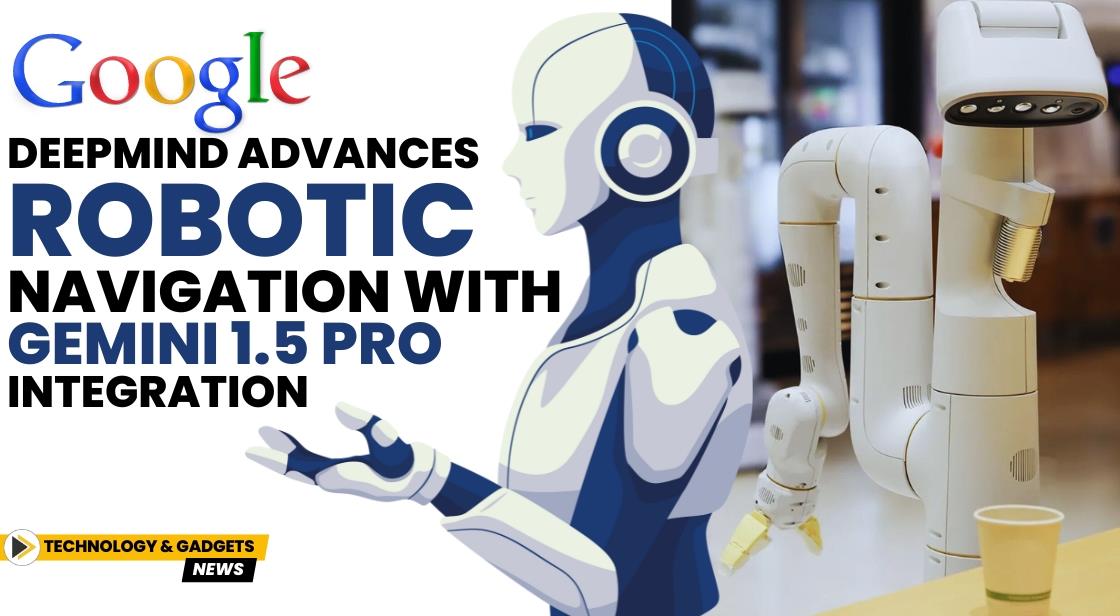Google DeepMind Advances Robotic Navigation with Gemini 1.5 Pro Integration

News Synopsis
Google DeepMind has made significant strides in robotics by integrating its advanced AI model, Gemini 1.5 Pro, with its robotic systems. This integration has led to remarkable improvements in robot navigation and understanding of real-world environments.
Gemini 1.5 Pro: The Driving Force
DeepMind's utilization of Gemini 1.5 Pro, with its expansive 2 million token context window, has been instrumental in enhancing robot capabilities. This large context window allows the AI model to process vast amounts of information, enabling it to understand and respond to complex commands and queries.
By training robots using Gemini 1.5 Pro, DeepMind has achieved breakthroughs in:
-
Navigation: Robots can now effectively navigate unfamiliar environments based on human instructions, video tours, and even vague commands. For instance, a robot can successfully locate a whiteboard when instructed to find a "place to draw."
-
Real-world understanding: The combination of Gemini 1.5 Pro and DeepMind's Robotic Transformer 2 (RT-2) model empowers robots to process visual information from the real world and translate it into actionable commands. This enables them to perform tasks based on human instructions and environmental cues.
The Role of RT-2
Google DeepMind's Robotic Transformer 2 (RT-2) model plays a crucial role in this advancement. It processes visual data from the real world and transforms it into a dataset that can be understood by the Gemini 1.5 Pro model. This integration of vision and language capabilities allows robots to make sense of their surroundings and respond accordingly.
Implications and Future Outlook
This breakthrough has the potential to revolutionize various industries, including robotics, automation, and human-computer interaction. Robots equipped with these advanced capabilities could be deployed in a wide range of applications, from household assistance to industrial automation.
However, it is essential to address potential challenges and ethical considerations associated with the development and deployment of such sophisticated AI systems. Ensuring safety, reliability, and transparency will be crucial as this technology continues to evolve.
DeepMind's advancements in robotics mark a significant step forward in the field of artificial intelligence. As the technology matures, we can expect to see even more sophisticated and capable robots in the future.
Challenges and Ethical Considerations in Robotic Advancements
While Google DeepMind's integration of Gemini 1.5 Pro with robotics marks a significant leap forward, it also brings to light a number of challenges and ethical considerations:
Challenges
-
Hardware Limitations: Real-world implementation of these advanced AI models requires powerful hardware and robust infrastructure, which might be a limitation in certain environments.
-
Data Privacy: Collecting and processing vast amounts of data to train these AI models raises concerns about data privacy and security.
-
Unpredictability: Complex AI systems can exhibit unexpected behaviors, making it challenging to fully understand and control their actions in real-world scenarios.
-
Job Displacement: The increasing capabilities of robots could lead to job displacement in certain sectors, necessitating strategies for workforce retraining and upskilling.
Ethical Considerations
-
Bias and Fairness: AI models can inherit biases present in the data they are trained on. Ensuring fairness and avoiding discrimination in robotic systems is crucial.
-
Safety and Reliability: Robust safety measures must be in place to prevent accidents or harm caused by malfunctioning robots.
-
Autonomy: Defining the appropriate level of autonomy for robots is essential. Overreliance on AI systems could lead to a loss of human control and accountability.
-
Human-Robot Interaction: Designing robots that can effectively interact with humans requires careful consideration of social and psychological factors.
Addressing these challenges and ethical considerations will be crucial for the responsible development and deployment of advanced robotic systems. As AI technology continues to evolve, ongoing research, collaboration, and ethical guidelines will be essential to ensure that robots are developed and used in a safe, responsible, and beneficial manner.
You May Like









